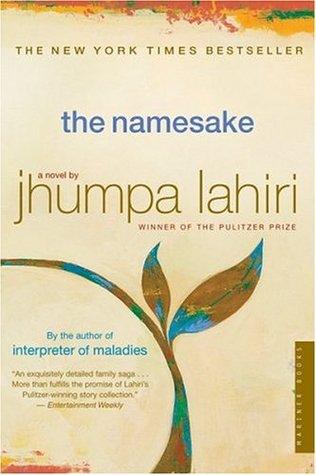The Namesake by Jhumpa Lahiri Book Summary
Discover a comprehensive summary and insightful review of "The Namesake" by Jhumpa Lahiri. Explore key themes, character analysis, and thought-provoking insights that highlight the immigrant experience and identity struggles. Dive into this literary masterpiece today!
The Namesake Book Summary
Jhumpa Lahiri's The Namesake explores the profound journey of identity, belonging, and cultural displacement through the Ganguli family's immigrant experience in America. This Pulitzer Prize-winning author masterfully weaves a multigenerational tale that examines how names, traditions, and heritage shape our sense of self while navigating between two worlds. The novel follows Gogol Ganguli as he struggles with his unusual name and Bengali-American identity, ultimately discovering that embracing one's roots doesn't mean sacrificing personal growth. Lahiri's elegant prose captures the universal themes of family expectations, cultural assimilation, and the complex relationship between parents and children in immigrant families.
Boost your website’s SEO and user engagement by strategically connecting related content. Explore The Lemonade War Book Summary, Review & Key Insights to enrich your readers’ experience and keep them exploring.
The Namesake by Jhumpa Lahiri - Introduction
I had no idea that a name could carry so much weight—like, it’s not just what people call you, but a whole story about identity and belonging. That’s what hit me reading The Namesake by Jhumpa Lahiri. I picked it up because I’d heard it was a beautiful piece of literary fiction about the Indian-American experience, and honestly, I was curious about how someone navigates feeling caught between two worlds.
What surprised me most was how Lahiri makes you feel the subtle, everyday struggles of cultural identity without any heavy-handed drama. It’s not just about being Indian or American—it’s about what happens in between, in those quiet moments when you wonder who you really are.
If you’re someone who’s ever felt like you’re living between two places, or even if you just love contemporary fiction that digs deep into family and identity, this book will resonate with you. Also, if you’re part of a book club, it’s perfect—there’s so much to unpack about culture, family, and self-discovery.
At around 291 pages, it’s a fairly quick read, maybe a few evenings or a weekend. I found myself really drawn in, and I think you will too—especially if you enjoy stories that are both intimate and universal, blending Indian literature with the broader human experience. Give it a shot; it might just change how you think about your own story.
What is The Namesake About?

The Namesake by Jhumpa Lahiri explores the life of Gogol Ganguli, the son of Indian immigrants, as he grapples with his cultural identity and the complexities of belonging in America. The book's main message highlights the struggles of navigating dual identities and the significance of family connections in shaping one's sense of self. Key concepts include the challenges of assimilation and cultural displacement, the impact of names and heritage on personal identity, and the importance of understanding and embracing one's roots to find true belonging.
About Book Author - Jhumpa Lahiri
Introducing Jhumpa Lahiri Tonight, we're so pleased to welcome a writer whose work beautifully bridges worlds. Jhumpa Lahiri didn't start out with a grand plan to document the immigrant journey with such nuance; rather, her own experiences navigating her Indian heritage while growing up in America became the fertile ground for The Namesake. This novel, much like her Pulitzer-winning collection Interpreter of Maladies, emerged from a deep-seated, personal need to explore the complexities of identity, family, and belonging.
What's interesting about Jhumpa Lahiri, and a detail I find particularly revealing, is her later profound immersion in the Italian language. She didn't just learn it; she moved to Rome and made the courageous choice to write and publish In Other Words first in Italian, a testament to her profound connection to language itself as a home.
Her true gift, her expertise, isn't just in crafting elegant prose, but in her remarkable ability to illuminate the subtle, inner lives of individuals caught between cultures, grappling with displacement and the search for self. She’s uniquely qualified to write on this because this isn't merely observation for her; it’s a lived reality, an intimate understanding she brings to all her characters, making works like Unaccustomed Earth so deeply resonant and true.
More Books To Find
The Namesake - Book Overview
It's about the journey of identity and belonging. The main character, Gogol Ganguli, navigates his life as the son of Indian immigrants in America, struggling with his cultural heritage and personal identity. It’s like watching someone trying to fit into a puzzle where the pieces don’t quite match.
Jhumpa Lahiri wrote it to explore the complexities of cultural dislocation and the immigrant experience. It’s not just about the surface-level challenges of fitting in; it’s about the deeper emotional struggles and the quest for self-acceptance. She delves into the nuances of how our names, family, and history shape who we are.
What sets it apart from other similar books is its focus on the intimate, everyday moments of life. Rather than grand events, Lahiri captures the quiet, poignant experiences that resonate with anyone who has ever felt out of place. It’s a deeply personal reflection rather than a broad commentary on immigration.
One story that stuck with me is when Gogol decides to change his name legally. It’s such a powerful moment, symbolizing his desire to break free from the weight of his heritage, yet it also highlights his internal conflict. That moment encapsulates the struggle between embracing one’s roots and the longing for acceptance in a different culture.
Key Insights of The Namesake
-
Cultural Identity: The struggle between Indian heritage and American culture is a central theme. Gogol's journey reflects the complexities of growing up in a multicultural environment, showcasing the challenges of balancing two identities.
-
Names and Identity: The significance of names is profound in the novel. Gogol's discomfort with his name symbolizes his struggle with his cultural identity. The renaming process illustrates how individuals seek to define themselves apart from societal expectations.
-
Family Dynamics: The relationship between Gogol and his parents, Ashoke and Ashima, highlights the generational divide in understanding cultural values. Their immigrant experience shapes their perspectives, influencing Gogol's sense of belonging and alienation.
-
The Immigrant Experience: Lahiri captures the challenges faced by immigrants, such as isolation and the quest for acceptance. The characters' experiences reflect the broader narrative of adapting to a new culture while preserving their roots.
-
Loss and Grief: The theme of loss permeates the narrative, particularly through Ashoke's death. Gogol's journey towards understanding his father's legacy underscores the importance of connection and the impact of grief on personal growth and identity formation.
Who Should Read This Book
"The Namesake" by Jhumpa Lahiri is a must-read for anyone interested in themes of identity, cultural conflict, and the immigrant experience. It resonates with readers who have navigated the complexities of belonging and the challenges of balancing heritage with personal aspirations. Those intrigued by rich character development and emotional depth will find themselves captivated by Gogol's journey. Additionally, individuals exploring the dynamics of family relationships and the impact of cultural expectations will appreciate the nuanced storytelling. This book is perfect for anyone seeking a profound understanding of the struggles and triumphs that shape our identities.
Read If You Are
- Interested in exploring themes of identity and cultural displacement.
- Seeking a deeper understanding of the immigrant experience in America.
- A fan of literary fiction that delves into complex family dynamics and relationships.
Skip If You Are
- Not interested in themes of cultural identity and immigration experiences
- Prefer fast-paced plots with constant action
- Dislike character-driven narratives that focus on personal growth and relationships
Important Takeaways from this Book
-
Embrace Your Cultural Identity: Take 30 minutes today to write down your family’s cultural traditions and values. Understanding and appreciating your heritage fosters a sense of belonging and boosts self-esteem. Consider how these elements shape your identity and influence your daily life.
-
Start a Conversation About Names: Reach out to a friend or family member and discuss the significance of your names. This action deepens relationships and helps you understand the stories behind your identity. Prepare to share your own name’s story to encourage openness.
-
Create a Personal Narrative: Spend an hour crafting a short narrative about a pivotal moment in your life that shaped who you are today. This reflection enhances self-awareness and helps you articulate your experiences to others. Ensure you choose a quiet space to think deeply.
-
Explore New Communities: Identify a local cultural event or group that interests you and commit to attending within the next week. Engaging with diverse communities broadens your perspective and builds connections. Check local listings or social media to find events.
-
Practice Active Listening: In your next conversation, focus on truly listening without interrupting. This practice improves your relationships and fosters empathy, allowing you to understand others’ experiences better. Set aside distractions and give your full attention to the speaker.
Book Review
I picked up "The Namesake" by Jhumpa Lahiri expecting a deep dive into the immigrant experience, and while I got that, I found it to be so much more nuanced than I anticipated. Lahiri’s writing style is beautifully lyrical, and her ability to weave in cultural details made me feel like I was living alongside Gogol and his family. The pacing felt just right—slow enough to savor the characters' development but engaging enough to keep me turning the pages.
One of the standout strengths is Lahiri's character development. Gogol's journey of identity is portrayed with such depth; I felt his struggles and triumphs intimately. For instance, the way he grapples with his name and cultural heritage resonated with me on a personal level. The scenes between Gogol and his parents are both tender and heartbreaking, showcasing the generational divide that often exists in immigrant families.
However, there were moments where the narrative felt a bit meandering, particularly in the middle sections. Some subplots could have been trimmed to maintain momentum. While I appreciated the exploration of themes like belonging and loss, I sometimes wished for a tighter focus.
In comparison to similar books like "The Joy Luck Club" or "Everything I Never Told You," "The Namesake" offers a more introspective look at identity, but it may not appeal to those looking for a fast-paced plot.
Overall, I found "The Namesake" to be a poignant exploration of identity and family. I’d recommend it to anyone interested in rich character studies and cultural themes, but if you prefer action-driven stories, this might not be for you.
Final Thoughts
If I'm being honest, finishing The Namesake left me with a profound sense of understanding about the immigrant experience and the complexities of identity. The way Jhumpa Lahiri captures the nuances of cultural dislocation and familial bonds is truly remarkable. I'd definitely recommend this if you're someone who appreciates deep character development and reflective storytelling. It’s perfect for readers who enjoy exploring themes of belonging and the clash between tradition and modernity.
On the flip side, skip this one if you're looking for fast-paced action or a light read; it’s more of a slow burn that requires some patience. The thing that surprised me most was how relatable Gogol’s struggles felt, despite the cultural differences—his journey of self-discovery resonates universally.
Months from now, I think the exploration of names and identity will stick with me the most; it really made me reflect on how our names shape our lives. I’d definitely recommend reading the full book rather than just a summary—it’s worth immersing yourself in Lahiri’s beautiful prose.
Overall, my reading experience was enriching, and I found myself reflecting on my own identity and connections long after I turned the last page.
Frequently Asked Questions
How long does it take to read The Namesake?
It typically takes about 6 to 8 hours to read The Namesake by Jhumpa Lahiri, which has 291 pages. Reading speed varies by individual, so your experience may differ based on your pace and engagement with the story.
What makes "The Namesake" different from other books in this genre?
The Namesake stands out for its deep exploration of identity, cultural dislocation, and the immigrant experience. Lahiri’s lyrical prose and relatable characters create an intimate connection, allowing readers to empathize with the complexities of balancing heritage and personal aspirations, making it a poignant narrative in contemporary literature.
Who is the target audience for The Namesake
The target audience for "The Namesake" includes readers interested in themes of identity, cultural displacement, and family dynamics, particularly those who appreciate literary fiction. It resonates with individuals navigating their own cultural experiences or those curious about the immigrant experience in America.
Are there any criticisms or limitations of The Namesake
Critics note that "The Namesake" may oversimplify cultural identity and immigrant experiences, focusing heavily on personal narrative over broader societal issues. Some readers find the pacing slow, while others feel certain characters lack depth, potentially limiting emotional connection.
What is the main theme of The Namesake by Jhumpa Lahiri
The main theme of "The Namesake" revolves around identity and cultural dislocation, exploring the struggles of first-generation immigrants in America. It delves into the complexities of family, belonging, and the search for self amidst the challenges of navigating two distinct cultures.
Tags:
Jhumpa Lahiri, The Namesake, The Namesake Book, The Namesake Book Rating, The Namesake Book Review, The Namesake Book Summary, The Namesake By Jhumpa Lahiri, The Namesake Description, The Namesake Short Summary

Michel Fisher
Michel Fisher is a passionate fiction enthusiast and book blogger who writes about emotional reads, character-driven stories, and contemporary romance authors that captivate hearts and minds.

The Namesake
Book Overview
Description
Jhumpa Lahiri's Interpreter of Maladies established this young writer as one the most brilliant of her generation. Her stories are one of the very few debut works -- and only a handful of collections -- to have won the Pulitzer Prize for fiction. Among the many other awards and honors it received were the New Yorker Debut of the Year award, the PEN/Hemingway Award, and the highest critical praise for its grace, acuity, and compassion in detailing lives transported from India to America.In The Namesake, Lahiri enriches the themes that made her collection an international bestseller: the immigrant experience, the clash of cultures, the conflicts of assimilation, and, most poignantly, the tangled ties between generations. Here again Lahiri displays her deft touch for the perfect detail — the fleeting moment, the turn of phrase — that opens whole worlds of emotion.The Namesake takes the Ganguli family from their tradition-bound life in Calcutta through their fraught transformation into Americans. On the heels of their arranged wedding, Ashoke and Ashima Ganguli settle together in Cambridge, Massachusetts. An engineer by training, Ashoke adapts far less warily than his wife, who resists all things American and pines for her family. When their son is born, the task of naming him betrays the vexed results of bringing old ways to the new world. Named for a Russian writer by his Indian parents in memory of a catastrophe years before, Gogol Ganguli knows only that he suffers the burden of his heritage as well as his odd, antic name. Lahiri brings great empathy to Gogol as he stumbles along the first-generation path, strewn with conflicting loyalties, comic detours, and wrenching love affairs. With penetrating insight, she reveals not only the defining power of the names and expectations bestowed upon us by our parents, but also the means by which we slowly, sometimes painfully, come to define ourselves.
Key Points
Cultural identity struggles
Characters
Ashoke Ganguli, Ashima Ganguli, Gogol/Nikhil Ganguli, Sonia/Sonali Ganguli, Maxine, Moushumi Mazoomdar
Publisher
Mariner Books
First Publish Date
10/28/03
Awards
Orange Prize Nominee for Fiction Longlist (2004), Los Angeles Times Book Prize Nominee for Fiction (2003)





